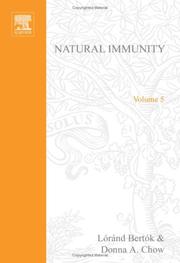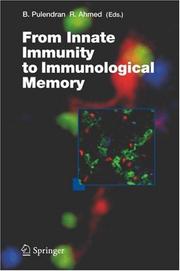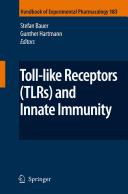| Listing 1 - 10 of 40 | << page >> |
Sort by
|

ISBN: 9780444517555 0444517553 0080460461 9780080460468 9786610630981 1280630981 Year: 2005 Publisher: Amsterdam : Elsevier,
Abstract | Keywords | Export | Availability | Bookmark
 Loading...
Loading...Choose an application
- Reference Manager
- EndNote
- RefWorks (Direct export to RefWorks)
""Natural Immunity"" is a broadly-based account of the activities of the evolutionarily conserved molecules, cells and processes of the natural immune system. This encompasses the early host protection against microbes (bacteria and viruses) and tumours, prior to the generation of the adaptive immune response, diverse major current pathologies including inflammatory and autoimmune diseases, and key roles in essential physiological processes such as reproduction and wound healing.* The first comprehensive book on natural immunity* Reviews new topics, effects of behaviour, aging, and
Natural immunity. --- Immune system. --- Immunological system --- Anatomy --- Immunology --- Disease resistance --- Host resistance --- Innate immunity --- Innate resistance --- Native immunity --- Natural resistance --- Nonspecific immunity --- Resistance to disease --- Immunity

ISBN: 1280635126 9786610635122 3540326367 3540326359 Year: 2006 Publisher: Berlin ; [London] : Springer,
Abstract | Keywords | Export | Availability | Bookmark
 Loading...
Loading...Choose an application
- Reference Manager
- EndNote
- RefWorks (Direct export to RefWorks)
The ability to remember an antigenic encounter for several decades, even for a life time, is one of the fundamental properties of the immune system. This phenomenon known as "immunological memory", is the foundation upon which the concept if vaccination rests. Therefore, understanding the mechanisms by which immunological memory is regulated is of paramount importance. Recent advances in immunology, particularly in the field of innate immunity, suggest that the innate immune system plays fundamental roles in influencing immunological memory. Indeed, emerging evidence suggests that events that occur early, within hours if not minutes of pathogen or vaccine entry profoundly shape the quantity, quality and duration of immunological memory. The present volume assembles a collection of essays from leading experts that span the entire spectrum research from understanding the molecular mechanisms of innate immune recognition, to dendritic cell function, to the generation and maintenance of antigen-specific B and T-cell responses.
Immunologic memory. --- Natural immunity. --- Immune response. --- Immunology --- Disease resistance --- Host resistance --- Innate immunity --- Innate resistance --- Native immunity --- Natural resistance --- Nonspecific immunity --- Resistance to disease --- Immunity --- Immune memory --- Immunological memory --- Memory, Immune --- Memory, Immunologic --- Immunology. --- Immunobiology --- Life sciences --- Serology

ISBN: 1281138096 9786611138097 3540721673 3540721665 Year: 2008 Volume: 183 Publisher: Berlin : Springer,
Abstract | Keywords | Export | Availability | Bookmark
 Loading...
Loading...Choose an application
- Reference Manager
- EndNote
- RefWorks (Direct export to RefWorks)
Overall recent research on TLRs has led to tremendous increase in our understanding of early steps in pathogen recognition and will presumably lead to potent TLR targeting therapeutics in the future. This book reviews and highlights our recent understanding on the function and ligands of TLRs as well as their role in autoimmunity, dendritic cell activation and target structures for therapeutic intervention.
Cell receptors. --- Natural immunity. --- Disease resistance --- Host resistance --- Innate immunity --- Innate resistance --- Native immunity --- Natural resistance --- Nonspecific immunity --- Resistance to disease --- Immunity --- Cell membrane receptors --- Cell surface receptors --- Receptors, Cell --- Binding sites (Biochemistry) --- Cell membranes --- Proteins
Book
ISBN: 0128094273 0128054204 9780128054208 9780128094273 Year: 2017 Publisher: London : Academic Press,
Abstract | Keywords | Export | Availability | Bookmark
 Loading...
Loading...Choose an application
- Reference Manager
- EndNote
- RefWorks (Direct export to RefWorks)
Autophagic vacuoles. --- Cell death. --- Natural immunity. --- Disease resistance --- Host resistance --- Innate immunity --- Innate resistance --- Native immunity --- Natural resistance --- Nonspecific immunity --- Resistance to disease --- Immunity --- Cell degeneration --- Cells --- Death (Biology) --- Autophagocytosis
Book
ISBN: 9811683867 9811683875 Year: 2022 Publisher: Gateway East, Singapore : Springer,
Abstract | Keywords | Export | Availability | Bookmark
 Loading...
Loading...Choose an application
- Reference Manager
- EndNote
- RefWorks (Direct export to RefWorks)
Lymphoid tissue. --- Natural immunity. --- Disease resistance --- Host resistance --- Innate immunity --- Innate resistance --- Native immunity --- Natural resistance --- Nonspecific immunity --- Resistance to disease --- Immunity --- Immune system --- Lymphatics --- Tissues --- Limfa --- Teixits (Histologia) --- Immunitat
Periodical
ISSN: 21525455 Year: 2005 Publisher: Washington, D.C. : U.S. Dept. of Agriculture, Agricultural Research Service
Abstract | Keywords | Export | Availability | Bookmark
 Loading...
Loading...Choose an application
- Reference Manager
- EndNote
- RefWorks (Direct export to RefWorks)
Fishes --- Natural immunity --- Natural immunity. --- Feeding and feeds --- Nutrition --- Feeding and feeds. --- Nutrition. --- Disease resistance --- Host resistance --- Innate immunity --- Innate resistance --- Native immunity --- Natural resistance --- Nonspecific immunity --- Resistance to disease --- Immunity --- Fish --- Pisces --- Aquatic animals --- Vertebrates --- Fisheries --- Fishing --- Ichthyology --- Food
Book
ISBN: 9283211391 9789283211396 Year: 1982 Volume: 39 Publisher: Lyon: International agency for research on cancer,
Abstract | Keywords | Export | Availability | Bookmark
 Loading...
Loading...Choose an application
- Reference Manager
- EndNote
- RefWorks (Direct export to RefWorks)
Cocarcinogenesis --- Neoplasms --- Carcinogenesis --- Natural immunity --- etiology --- Congresses --- Cocarcinogenesis. --- Cocarcinogeneses --- Carcinogens --- Drug Synergism --- etiology. --- Disease resistance --- Host resistance --- Innate immunity --- Innate resistance --- Native immunity --- Natural resistance --- Nonspecific immunity --- Resistance to disease --- Immunity --- Cocarcinogenesis - congresses --- Neoplasms - etiology - congresses --- Carcinogenesis - Congresses --- Natural immunity - Congresses
Book
ISBN: 0128102640 0124051685 0124047327 1306087260 9780124051683 9781306087261 9780124047327 9780128102640 Year: 2014 Publisher: London : Academic Press, an imprint of Elsevier,
Abstract | Keywords | Export | Availability | Bookmark
 Loading...
Loading...Choose an application
- Reference Manager
- EndNote
- RefWorks (Direct export to RefWorks)
Biological DNA Sensor defines the meaning of DNA sensing pathways and demonstrates the importance of the innate immune responses induced by double stranded DNA (dsDNA) through its influencing functions in disease pathology and immune activity of adjuvants for vaccines. Though discussed in specific subsections of existing books, dsDNA and its immunogenic properties has never received the complete treatment given in this book. Biological DNA Sensor approaches the impact of dsDNA's immunogenicity on disease and vaccinology holistically. It paints a complete and concise pi
Biosensors. --- Natural immunity. --- Nucleic acids. --- Polynucleotides --- Biomolecules --- Disease resistance --- Host resistance --- Innate immunity --- Innate resistance --- Native immunity --- Natural resistance --- Nonspecific immunity --- Resistance to disease --- Immunity --- Biodetectors --- Biological detectors --- Biological sensors --- Biomedical detectors --- Biomedical sensors --- Detectors --- Medical instruments and apparatus --- Physiological apparatus

ISBN: 0306464098 9786610042951 1280042958 030646831X Year: 2000 Publisher: New York ; Boston ; London Kluwer academic/Plenum publishers
Abstract | Keywords | Export | Availability | Bookmark
 Loading...
Loading...Choose an application
- Reference Manager
- EndNote
- RefWorks (Direct export to RefWorks)
In recent years increased scientific attention has been given to immediate defense mechanisms based on non-clonal recognition of microbial components. These mechanisms constitute the innate immunity arm of the body s defense. Identification of pathogens by these mechanisms involves primarily receptors recognizing sugar moieties of various microorganisms. Innate immunity based mechanisms are essential for the existence of multicellular organisms. They are evolutionarily conserved and designed to provide immediate protection against microbial pathogens to eradicate infection. Activation of innate immunity is crucial for transition to specific immunity and for its orientation, and to assist the specific immune response in the recognition of pathogens and their destruction. Innate immunity is regularly involved in the arrest of bacterial, mycotic, viral and parasitic infections, giving the specific immune response time to become effective. It becomes critically essential in immunocompromised patients who fail to mount specific immune responses due to congenital or acquired immunodeficiencies as a result of chemotherapy, dialysis, immunosuppressive drugs, or HIV infection. The Innate Immunity arsenal constitutes polymorphonuclear and mononuclear phagocytes, mast cells, the complement system, Natural Killer cells, antimicrobial peptides, and presumably a subset of T lymphocytes with TCRl receptors.
Natural immunity --- Congresses --- Immunology. --- Emerging infectious diseases. --- Microbiology. --- Medical virology. --- Medical parasitology. --- Infectious Diseases. --- Medical Microbiology. --- Virology. --- Parasitology. --- Infectious diseases. --- Medical microbiology. --- Biology --- Microbiology --- Immunobiology --- Life sciences --- Serology --- Disease resistance --- Host resistance --- Innate immunity --- Innate resistance --- Native immunity --- Natural resistance --- Nonspecific immunity --- Resistance to disease --- Immunity
Book
ISBN: 9782889193103 Year: 2014 Publisher: Frontiers Media SA
Abstract | Keywords | Export | Availability | Bookmark
 Loading...
Loading...Choose an application
- Reference Manager
- EndNote
- RefWorks (Direct export to RefWorks)
Inflammation of the brain in the context of neurodegenerative disorders is an area of intense debate and discussion, not least in terms of its pathogenic significance and the extent to which it drives disease processes and pathology. This inflammation can take several forms including innate responses involving microglia, humoral responses involving antibody, complement mediated processes and cellular T-cell activation, of which the role and extent of each may differ between diseases. Whilst some diseases have been more intensely linked to inflammation and long-term degeneration (e.g. MS), more traditional chronic neurodegenerative disorders have been thought of in terms of intrinsic neuronal pathology with a secondary innate response. However, it has been described that microglia activation is an early event of many degenerative disorders and evidence is accumulating that it may play a critical role in actually causing pathology and driving disease processes. If true, this would have major therapeutic implications, but what is the evidence that this is the case?The initial observations by Patrick McGeer’s group of post-mortem tissue from patients with Parkinson’s disease revealed the presence of activated brain microglia long-term and has thus lead to the hypothesis that chronic inflammation could participate to neuronal degenerative processes. The significance of these original observations has only been recently revisited, and the development of more powerful tools to study the brain immune response has certainly contributed to this field of research. Chronic inflammation in the brain can take many forms but of particular interest has been the resident microglia and the role they play in this process. In this context, microglia have often been thought to become activated only after the disease has begun and then to contribute minimally to the degenerative process. Emerging new concepts challenge this view by proposing that microglial senescence, for example, may release the disease process and/or accelerate it. In addition, microglia, once activated, can adopt different phenotypes which can be both pro-inflammatory and pro-repair and may impact not only on the healthy adult neuronal population but on those new neurons derived from neurogenic niches of the adult brain.In this Research Topic, we attempt to explore this by first considering the innate immune responses in the brain and the methods by which they can be studied experimentally and in patients with various neurodegenerative disorders. This sets the scene for then discussing a range of different disorders including Alzheimer’s, Parkinson’s, Huntington’s disease and amyotrophic lateral sclerosis. These papers seek to discuss the evidence for an innate immune response and whether this is beneficial or detrimental, as well as its therapeutic implications.
Natural immunity. --- Nervous system --- Degeneration. --- Disease resistance --- Host resistance --- Innate immunity --- Innate resistance --- Native immunity --- Natural resistance --- Nonspecific immunity --- Resistance to disease --- Immunity --- Degeneration, Nerve --- Nerve degeneration --- Nervous system degeneration --- Neurodegenerative disease --- Neurodegenerative diseases --- Neurodegenerative disorders --- Neuron degeneration --- Nissl degeneration --- Retrograde degeneration --- Wallerian degeneration --- Degeneration (Pathology) --- Degeneration and regeneration --- Therapeutics --- Inflammation --- Animal Models
| Listing 1 - 10 of 40 | << page >> |
Sort by
|

 Search
Search Feedback
Feedback About UniCat
About UniCat  Help
Help News
News